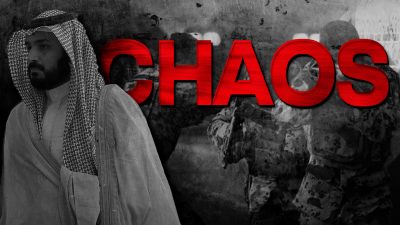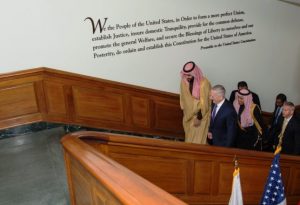Saudi Arabia Regional and Global Linkages

Introduction
Saudi
Arabia has built a powerful network of regional and local political,
military and economic relationships incorporating a shared
extremist-religious affiliation. As a result, despite its reputation
as
a backward despotic clerico-monarchy with an extreme dependency on oil
sales, it has become a deadly political force in the Middle East and
beyond.
To understand
the dynamics and projections of Saudi power it is important to identify
and analyze how it uses its use military, religious and economic
weapons.
Saudi Arabia: Senility and Mercenary Protection
Saudi Arabia
has bankrolled and supplied violent mercenary armies in Syria, Iraq,
Somalia, Yemen, Libya, Lebanon, Afghanistan, Pakistan, Philippines,
Malaysia and several other Asian and African countries.
The Saudi’s
intolerant Wahhabi branch of Sunni Islam and its commercial mercenaries
act to overthrow and shatter Arab regimes and societies that have
independent modern, nationalist and secular leadership or practice
multi-ethnic or multi-religious tolerance. They also target republics
with Shia-majority governments opposed to Saudi-Wahhabi domination in
the Middle East.
Saudi’s goal
has been to shred modern, multi-ethnic societies and impose brutal
‘follower’ regimes, which will shield the senile Arab monarchs from
overthrow by internal and external popular, nationalist and democratic
forces.
Saudi Arabia’s Purchase of Global and Regional “Allies”
The Saudis
monarchy finances and props up unpopular, anti-democratic regimes in
order to secure military allies and sources of mercenaries: Saudi oil
wealth has paid for military officers and troops from Pakistan, Egypt,
Yemen and Jordan to impose its hegemonic ambitions.
Saudi Arabia
has longstanding economic and military ties with the US, UK, France and
other NATO countries. US military bases and arms, as well as British and
French arms sales, serve as payments for praetorian guards of the
narrowly based despotism.
Saudi
oil wealth has financed thousands of overseas religious schools and
cultural centers to teach the most intolerant form of Wahhabi Islam.
They award scholarships to talented young Muslims willing to spread
Wahhabi propaganda and recruit mercenaries and political activists to
advance the Saudi Monarch’s projections of global power.
Saudi Arabia
has long established de facto linkages with Israel, despite their
superficial religious differences, based on their intense racist
tribalism and common opposition to independent Iran and secular,
nationalist Arab states, like Lebanon, Syria and Iraq, and popular
liberation movements in the Middle East.
In large part,
the Saudi Monarchy survives on ‘borrowed power’ – trading oil wealth
for military and financial advisers. The fundamental Saudi weakness and
political pathology become clear when they choose to attack and blockade
the militarily weakest and most vulnerable countries in the Middle
East: Yemen and Qatar.
Despite
billions of dollars spent in dropping thousands of tons of bombs on
Yemen and arming thousands of mercenaries, the Saudi-proxies have at
most conquered a third of that devastated country and less than a
quarter of its starving population. The Saudi ‘princes’ have committed
the most vicious war crimes in the course of their war on Yemen:
destroying most of the vital infrastructure, killing thousands,
spreading cholera by bombing the water treatment system and starving
millions of civilians in its attempt to force submission.
Nevertheless, Saudi Arabia has suffered numerous cross border attacks
and even a recent Yemeni rebel missile strike against its main airport.
Qatar aroused
Saudi wrath for its independent regional oil diplomacy – including
seeking friendly relations with its huge neighbor, Iran. The furious
Saudis financed three regional dictatorships, Egypt, Jordan and
the UAE, to join a boycott against tiny Qatar. These actions have
boomeranged on the Saudis, leading to increased Qatari trade deals with
Iran and Iraq, effectively by-passing the mighty Saudi king’s sanctions.
It is increasing obvious that the decrepit Saudi monarchy cannot
effectively flex its flabby muscles against its own backwater neighbors.
Saudi projections of power beyond its
immediate neighborhood have equally failed to enhance the monarchy’s
image as a global power. Saudi-funded ISIS mercenaries have been
decisively defeated, destroyed by Iraq-Shia forces and by the Syrian
government-Russian-Iranian-Hezbollah alliance in Syria. As a result the
volunteer mercenaries have grabbed their salaries and fled back to their
home countries to create mischief.
Saudi-backed
mercenary terrorists in Afghanistan are being marginalized by the
Taliban, who may still enjoy some residual Saudi largesse but pursue
their own nationalist agenda.
The Saudis
signs off on covert operations with Israel, a case of mutual
manipulation based on their common enmity to Iran, Syria, Hezbollah,
Hamas and Yemen. This has resulted in a strange marriage of Saudi
Wahhabis, Wall Street Zionists and fanatical Israeli militarists.
Donald Trump’s ‘Saudi’ Moment: Waltzing with Mohamed bin Salman
In early November 2017, Saudi Arabia’s Crown Prince and Deputy Prime Minister, Mohammed bin Salman
(MBS), arrested 30 ministers and generals, an ‘Arab Warren Buffet’
billionaire and 11 bloated princes, seizing nearly a trillion dollar in
assets. This was the biggest purge in Saudi history. A few more
disposable princes met early deaths in the process.
MBS cloaked his power grab as part of an ‘anti-corruption’ campaign
to cleanse the state bureaucracy and replace them with appointments
directly loyal to MBS. The Crown Prince has packaged his coup as a ‘historic transformation’ – purging the old guard to bring about the monarchy’s modernization. Most observers dismiss MBS’s ‘good government’ rhetoric as ‘BS’ and a thin cloak for his consolidation of a personal dictatorship.
The Crown Prince’s idea of ‘modernization’ has been accompanied by regional military provocations, threats, and domestic factional wars. MBS’s blueprint for the ‘transformation’ of
Saudi Arabia may not attract the kind of foreign investment he needs.
MBS’ move to blockade tiny Qatar, where a strategic US airbase and
thousands of American troops are stationed, provoked Pentagon
disapproval.
MBS ordered the Lebanese Prime Minister Saad al Hariri,
a puppet of the Saudi monarchy and a dual Lebanese-Saudi citizen, to
fly to Riyadh and announce his resignation on Saudi TV. He read a script
denouncing Iran and Hezbollah (member of the current Lebanese governing
coalition) as plotting Hariri’s assassination. So that no one would
fail to catch the connection with MBS, Hariri has gone into hiding in
Saudi Arabia and refuses or is unable to fly home.
MBS’s plan to
seize power was first cleared with the US following a mid-year meeting
with President Trump. The impending purge was signed off with a two
billion dollar oil deal between Washington and Riyadh.
The despotic,
but ‘visionary’, Crown Prince offered Wall Street the Saudi ‘crown
jewels’, promising to privatize ARAMCO the trillion dollar state oil
company. He offered multi-billion deals to US and EU investors to build
modern megacities for Saudi citizens to replace the lethargic corrupt
oil-based Princes, bureaucrats and holy men.
Saudi regional
war maneuvers and the ongoing domestic coup provoke fear of greater
regional instability among investors. MBS’s anti-Iranian rhetoric and
wild threats to attack Teheran may have excited Israeli Prime Minister Netanyahu and his new White House poodle, US President Donald Trump, but this has not impressed the Generals in Trump’s Cabinet or the Wall Street bankers.
MBS’s unstable
regime, his war mongering and the sell off of oil does not add-up to
the kind of political and economic foundations necessary for a modern,
sophisticated diversified economy. Most observers conclude that the sale
of ARAMCO is a one-off deal with few spin-offs in terms of skilled
jobs, local enterprises and economic diversification.
At present, MBS has ‘won over’ the deposed and highly unpopular former ruler of Yemen, Abdrabbuh Mansour Hadi.
His powers of persuasion have worked their magic on the elusive or
‘self-exiled’ former Lebanese Prime Minister Saad Hariri and the
geographically befuddled American President Trump. MBS hires the most
senior ex-pat executives from the US and UK to run the oil sell off. He
intends to market himself as a ‘modernizing despot’ – at least until the
next princely intrigue boots him from power. Meanwhile he settles back
as a ‘modern’ Middle East potentate, protected by tribal clans, despised
by his people, privately ridiculed by his overseas flatterers and
expertly ‘serviced’ by expats-on-the-make. No doubt he would be humored
by any clown occupying the US White House.
For now, the
Saudis can still attract mercenaries, beat up and starve millions of
Yemenis, sell oil and continue to finance terrorist bombings in Beirut,
Baghdad, Paris and . . . New York!
Conclusion
Saudi Arabia and Israel play the key roles in anchoring the ‘arc of reaction and terror’ in
the Middle East. Both foment wars, finance terrorism and spread
ethno-religious fragmentation leading to millions of refugees.
Saudi Arabia’s
‘Crown Prince MBS’ competes with Israel’s Netanyahu in concocting the
most outrageous warmongering slander against Iran, preparing the world
for global conflagration.
MBS is
actively serving the Israelis by fomenting sectarian divisions in
Lebanon to provide Israel with an excuse to attack Hezbollah and
millions of Lebanese civilians. MBS claims that a single missile from
Yemen that hit the Riyadh airport was a full declaration of war by
Teheran . . . as if the Saudis’ starvation blockade and daily bombing of
Yemeni cities would not warrant any counter-attack.
The war fever
in Riyadh is a cover for MBS’s political impotence and a ‘clever ploy’
to distract from the infantile game of rotating princes and clan
intrigues.
MBS, for all
his modernizing clichés and carefully groomed public relations persona,
circulated by the corrupt Western media, is still the aspiring head of a
tribal army, dependent on a fragile alliance with unreliable allies:
The Egyptian high command and troops despise the bloated Saudis;
Bahrain’s ruler is propped up by Saudi mercenary forces; the Saudi
masses are held in check by tribal warlords and their torturers; and the
imported workforce and armies of foreign domestic servants are
brutalized, raped and cheated. Hardly an inspiring leader of Saudi
Arabia’s emergence from the Middle Ages.
The Crown
Prince is sitting on a powder keg threatening to shatter the political
alignments in the Middle East and the global financial and oil markets.
Saudi Arabia is a fragile regime with a long and scrawny reach. The
current rulers imagine their borrowed power and palace intrigues can
flourish on such rotten foundations and with a despised oligarchy.
The
first missile that MBS dares to direct at Teheran will mark the
downfall of the House of Sand. The entire Middle East and global markets
will plunge into a profound crisis. Oil prices will soar, stock markets
will crash and Israel will go to war against Hezbollah. Donald Trump
will send US forces to confront with the well-armed and highly patriotic
Iranians on their soil. Iraq and Syria will confront the US regional
puppets, the Kurds. China, Russia and India wait to sign on huge oil
deals. The US fracking industry will celebrate as oil prices set new
highs.
Saudi
Princes will flee to Europe, leaving hundreds of thousands of servants
in the lurch. Perhaps they will have to prepare their own coffee! Trump
will issue a ‘Tweet to Action to All Americans’ – Marines to the
oil wells! Makes America Great Again on the tired backs of our GIs!
AIPAC will secure a unanimous vote in the American Congress declaring
that Saudi Arabia’s oil fields are really part of the Greater Israel.
With
historic high oil prices, Venezuela will recover, pay its debts,
finance its social agenda, re-open its schools and clinics and re-elect a
socialist president.
A
consortium of western investors will take over, after the Saudis have
folded their tents and fled to Central London, and flood the oil
markets. But that is a long-term scenario…or is it?
The original source of this article is Global Research
Copyright © Prof. James Petras, Global Research, 2017
Comment on Global Research Articles on our Facebook page
Become a Member of Global Research

No comments:
Post a Comment